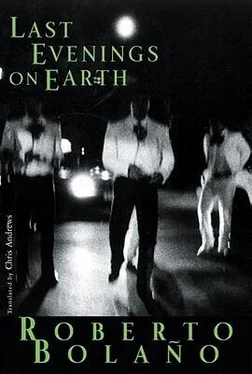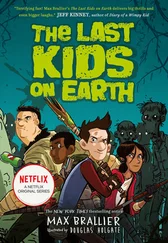Better than any of them, he said. Mexico's famous writers were like babes in arms compared to this rather fat, inexpressive adolescent with his hands hardened by work in the fields. What fields? I asked. The fields all around us, said the dentist, moving his hand in a circular gesture, as if Irapuato were an outpost in the wilderness, a fort in the middle of Apache territory. I took a fearful, sidelong glance at the boy and saw that he was smiling. Then my friend began to tell me about one of Ramirez's stories, a story about a child who had to look after his numerous younger brothers and sisters, that was the gist of it, the first part anyway, because then the plot swung around and smashed itself to pieces, and it became a story about the ghost of a schoolmaster trapped in a bottle, and about individual freedom, and new characters appeared: a pair of shady faith healers, a twenty-year-old girl on drugs, a guy reading a book by de Sade and living in a wrecked car beside the highway. All this in one story, said my friend.
And although the good-mannered thing to say would have been: Mmm, sounds interesting, I said I couldn't really express an opinion without reading it for myself. That's how I let myself in for it, when good manners could have saved me. My friend stood up and said to Ramirez, Let's go and get the stories. I remember Ramirez looked up at him, then across at me, and finally stood up without a word. I could have protested. I could have said it wasn't necessary. But by then I was already chilled through and nothing mattered to me anymore, although from somewhere deep inside I was watching our movements, which seemed to be orchestrated with an almost supernatural precision, and although I knew that those movements were not leading us toward any physical risk, I was also aware that in another sense we were venturing into dangerous territory, from which we would not be allowed to return without having paid a toll of pain or estrangement, a toll that we would eventually come to regret.
But I said nothing. We left the bar, got into my friend's car, and proceeded to lose our way among the streets on the edge of Irapuato, where the only other vehicles were police cars and the odd bus, streets that young Ramirez walked, so my friend told me as he drove on in a state of rapture, every night or every morning, returning from his forays into the city. I chose not to make any further comment and looked out at the feebly lit streets and the shadow of the car, intermittently projected onto the high walls of factories or abandoned warehouses, vestiges of a former time, already consigned to oblivion, when attempts had been made to industrialize the city. Then we emerged into a kind of suburb attached to that jumble of obsolete buildings. The street narrowed. There were no streetlights. I heard dogs barking. Like something from The Children of Sбnchez, isn't it, said the dentist. I didn't reply. Behind me I heard Ramirez's voice saying to turn right, then keep going straight ahead.
The headlights swept across a dirt road and lit up two wretched shacks behind a fence made of wood and wire, and then we emerged suddenly into what seemed to be open country, although it could equally have been a garbage dump. From there we continued on foot, Indian file, Ramirez leading the way, followed by the dentist and me. In the distance I could see headlights gliding along a highway: another world, and yet I felt those distant moving lights were somehow— horribly — emblematic of our destiny. I saw the silhouette of a hill. I sensed a movement in the darkness, among the bushes, and immediately thought: Rats, although it could just as well have been birds. Then the moon came out and I saw little houses scattered over the lower slopes of the hill and, farther off, a dark, plowed field, stretching away to a bend in the highway where a wood jutted up like a construction. Suddenly I heard the boys voice saying something to my friend and we stopped. His house had appeared from nowhere; the walls were yellow and white, and it had a low roof, like all the other sad-looking houses holding out against the night on the outskirts of Irapuato.
For a moment the three of us stood there in silence, spellbound, contemplating the moon or looking sadly at the boy's cramped dwelling or trying to make sense of the objects piled up in the yard: the only thing I could identify with any certainty was a crate. Then we went into a room with a low ceiling that smelled of smoke and Ramirez switched on a light. I saw a table, farm tools leaning against the wall, and a child asleep in an armchair.
The dentist looked at me. His eyes were gleaming with excitement. But I felt we should have been ashamed of what we were doing: rounding off a night on the town with a bit of schadenfreude. Except that we would be contemplating our own misfortune as well, I thought. Ramirez brought over two wooden chairs before disappearing through a doorway that seemed to have been hacked out with an axe. I soon realized that the room in which we were standing was a new addition to the house. We sat down and waited. When Ramirez reappeared he was carrying a stack of papers more than two inches thick. With a look of concentration he sat down and handed it to us. Read whatever you like, he whispered. I looked at my friend. He had already taken a story from the pile and was carefully arranging the pages. I said I thought the best thing to do would be to borrow the stories, take them back to my friend's house, and read them at our leisure. Or maybe I didn't actually say that, probably not. But thinking about it now, I can't imagine the scene any other way: me saying, Let's take them back and read them later, we'll be more receptive, and the dentist looking at me with something hard in his gaze, like a man condemned to death, ordering me, Just pick a story at random and read it, for Christ's sake.
So I did. I lowered my eyes, ashamed, chose a story and began to read. The story was four pages long; maybe that's why I chose it, because it was short, but when I got to the end, I felt as if I had read a novel. I looked at Ramirez. He was sitting in front of us, nodding off. My friend followed my gaze and told me in a whisper that the young writer got up very early in the morning. I nodded and chose another story. When I looked at Ramirez again he was slumped forward, sleeping with his head on his arms. Earlier, I had been almost falling asleep myself, but now I felt wide awake and absolutely sober. My friend passed me another story. Read this one, he whispered. I put it aside and finished the one I was reading before starting it.
As I was coming to the end of the third story, the other door opened and a man appeared who must have been about our age, but seemed much older. He smiled at us before walking quietly out into the yard. Josй's father, said my friend. Outside I heard tin cans knocking, quickening steps, and the sound of someone urinating onto the ground. In a different situation, this would have been enough to put me on my guard; I would have been straining to interpret those noises, preparing to avert a potential danger, but instead I went on reading.
We never stop reading, although every book comes to an end, just as we never stop living, although death is certain.
But, to put it in plain terms and make myself clear, at a certain point I decided that I had read enough. My friend had stopped a while before. He was visibly tired. I suggested we leave. Before standing up, both of us looked at Ramirez, who was sleeping peacefully. When we went outside, day was dawning. There was no one in the yard and the fields all around seemed barren. I wondered where the father had gone. My friend pointed to his car and remarked how strange it was that the car didn't seem strange in those surroundings. Some surroundings! he added, no longer whispering. His voice sounded odd to me: hoarse, as if he had spent the night shouting. Let's go and have some breakfast, he said. I nodded. He said, We can talk about what's happened to us.
Читать дальше












